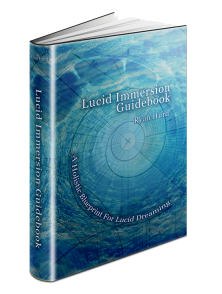
In the lucid dreaming community, there’s a lot of emphasis on how to lengthen lucid dreams and prevent awakening. There is nothing wrong with this. The skill of holding your attention span and riding the turbulent sea of REM takes time to develop, and waking practices hold the key to developing this capacity. However, longer lucid dreams are not necessarily better dreams, or automatic achievements. To think so would be to deny the neuromythological structure of the dreaming mind.
Let me break that down:
From a neurological standpoint, many lucid dreams occur in the first place due to cortical arousal, when the brain is already transitioning into waking awareness.
From a mythological standpoint, we could say that lucid dreams reach a conclusion because the dream has achieved its own end–on its own timetable–regardless of what you want to happen next.
Neuromythology, therefore, emphasizes the inherent storytelling framework of the dream, rooted not only in our expectations and desires, but also the emotional, linguistic and visionary structures of the lucidly dreaming brain.
4 examples of short but “successful” lucid dreams include:
• The dream image transforming into a previously unknown or unexpressed emotion, leading to awakening with that emotion still in the air.
• A realization, a provocative statement by a dream figure, or a new understanding that leads to arousal.
• A powerful image that demands attention, often nightmarish and scary. These are important because they may carry some information that the waking self usually represses.
• Spontaneous orgasm, transcendent bliss and feelings of oneness. ‘Nuf said.
In all of the above cases, trying to remain in the dream may be missing the point, and perhaps an opportunity.
[pullquote]Waking from the dream is a metaphorical gift of bridging the gap between worlds[/pullquote]
After all, dreams bring new information and emotional truths into awareness. Waking from the dream is a metaphorical gift of bridging the gap, as the information has crossed the boundary into the waking world.
My longest lucid dreams (somewhere in the 30-40 minute range) have not proven to be the most impactful… or the most memorable. In fact, some of my most powerful lucid dreams probably lasted less than two minutes after I became self-aware.
Here’s an example of a lucid dream that was short-lived but involved a powerful realization:
I’m in a version of my apartment. Some objects are out of place—I notice the microwave in the living room and realize I’m dreaming. I call to my younger brother, “Hey, this is a dream!” He comes down the steps and looks excited. He looks strong, and there are light etchings like tattoos all over his face that look like rock art spirals. I tell him, “This is my dream but you are still real—you have your own consciousness, I get that now.” He smiles broadly and his eyes flash with intelligence. I am emotional, full of love, respect and trust. He feels like he’s my older brother. I wake up, my heart full of hope. (3/30/11).
In this dream, I realize the profound respect I have for my younger brother, and how he sometimes carries my strength and resilience. He reveals himself as a warrior; the etchings on his face I interpret as symbol of our shared lineage in Ireland and Scotland. It is one of a long series of lucid dreams that has opened up a portal to my own indigenous roots and allowed the strength of my ancestors to spill into this world.
That’s my myth anyways…
 So honor these short and sweet dreams by writing them down before you go back to sleep. You will forget them!
So honor these short and sweet dreams by writing them down before you go back to sleep. You will forget them!
And even better, waking is the perfect time to reset an intention and go back into the dream, letting the storytelling process continue with a new chapter.
The essay is adapted from my mastermind guide the Lucid Immersion Blueprint.
First Image: CC 2010 In this Fairytale World by JerryCharlotte
I call them “snap points” where I will either wake up from a lucid dream or the dream will take me to a new scene. I find if I let dream roll they will successively lead me to some insight and at this stage I will awaken with a wash of emotions rolling through me. it is critical at this point to not move at all and let the memory’s come back and to bathe in the feelings.
great advice Peter. I like your snap point concept too: they’re like natural fissures in the dream — like good stone workers we have to work with idiosyncrasies of the material
This is really great to remember and to have it explained so well from different points of view. One of my goals is to lengthen my lucidity but knowing that it isn’t necessarily better is very freeing because then I can just practice my concentration skills without missing those short and sweet ones that really do have just as much, if not more impact. “Nueromythology,” I love that, did you coin the term?
thank Ryan…
I didn’t coin neuromythology — actually I think the word first was used in the medical community in the 1980s to refer to untrue stories about the brain, “neuromyths.”
But it’s time to reclaim the word – not for “untrue stories” but for the “oldest and most universal of stories” that will always be part of the human experience. Psychologist John Teake suggested this term in 2006 as an alternative to “neurotheology” because it has less religious baggage http://www.ingentaconnect.com/content/bpl/zygo/2006/00000041/00000001/art00012
Ah, well amen to that reclamation! Cool link too, kinda blows my mind. Which is good because I’m trying to stay in “beginner’s mind” and I’ve been realizing that I don’t actually know or understand anything, in waking life or dreaming. Well, c’mon, I always knew that but now I just don’t feel so negative about it…
Interesting perspective, Ryan. Tips for lengthening lucid dreams are probably most useful when you can’t sustain your awareness for more than a few moments. But you’re right–in my experience, I do remember the emotional impact of a dream or lucid dream more clearly when I awaken naturally.
thanks KMG! will you be coming up to the international dream conference this month in Berkeley?
Thanks for the great advice Ryan! My lucid dreams usually occur when I go down for an afternoon nap (don’t know if this is normal) and I get the luxury of asking questions and getting answers in my dreams. Not that I trust these answers to a full extent, but I always end up disappointed when I wake up that I asked too many questions and in the waking world I hardly remember the answers. Here’s the dream I had this afternoon:
I’m at my uncle’s house where there are of course a bunch of trucks. I know off the bat that I’m dreaming. The yard, sky and rest of the beautiful environment look authentic, almost even better than in waking. Someone starts driving one of the trucks and I stand my ground. I’m told I have to use my fear as a tool. My fear spikes as the truck drives right through me. I’m going to guess that the nerves in my amygdala were stimulated and then spread down through my body. The rest of the trucks I used telekinesis to pick up and send flying (my dreams and I have this give-take relationship: they scare me then I get to do what I want). I decide I’m being rude and since I’ve been trying to behave lately in my dreams I go to ask my uncle if it’s okay that I fling those trucks. He arrives with Will Ferrell in his passenger seat but before I can ask the dream blacks out and goes into purely thinking mode. Now the dream starts rewarding me with a euphoric feeling (not quite ecstasy but I have achieved that before in my sleep) as i try to realize what it seems to want me to realize. The right side of my brain gets the feeling and I guess that it’s endorsing randomness as a playing card flashes into view. I hear a bird chirping at the north-north-east region of my brain. I forget what realization stimulated the left side of my brain, but it was the same euphoria. All the while I’m listening to the radio from the waking world as a Foo Fighters song I really enjoy starts playing. I’m really hoping my nerves start pulsing at my favorite part of the song (What’s in it for me…) as they do on occasion, but I actually wake up right as that part starts to play.
My dreams are wild rides and if anyone disputes I’m having them I always let them know I’m willing to take a polygraph test. Ryan, you mentioned the “lucid dreaming community.” Is there an online forum for lucid dreamers? Also I would be glad to ask a question you might have in a dream (I asked what dark energy was and it just showed a bright sphere in space flying at me).
How do you know the difference between a dream an out of body experience?
Please don’t dismiss me as a nobody. An out of body experience is what we undertake with the help of a spirit/guide from the other side. It happens yet we dismiss it as a dream because there is no way of establishing its specificity. Sleep paralysis is also a step closer to adult death syndrome. But no body else is making the connections as I have already discovered. People have died through not fighting the overwhelming, unable to breath paralysis sensation that some of us experience. I often have these episodes and I know it’s bad. I know if I don’t fight it and I succumb to it then I won’t wake and I’ll be gone. It’s as real as it gets but no one wants to believe except those who know a little more. It is a portal to the other side. Don’t believe me then next time you have sleep paralysis let yourself go and don’t fight. They’ll say it was adult death syndrome. Take care. Jonathan Gould
Shelly Adler’s book is Sleep paralysis: night-mares, nocebos, and the mind-body connection. Highly recommended for this issue of the relationship of sleep paralysis to SUNDS and the brogada syndrome. Bottomline — our beliefs about reality may, in some cases, trigger anxiety to such a level as to worsen a pre-existing heart condition. This, however, is not the same as saying that sleep paralysis nightmares cause death.